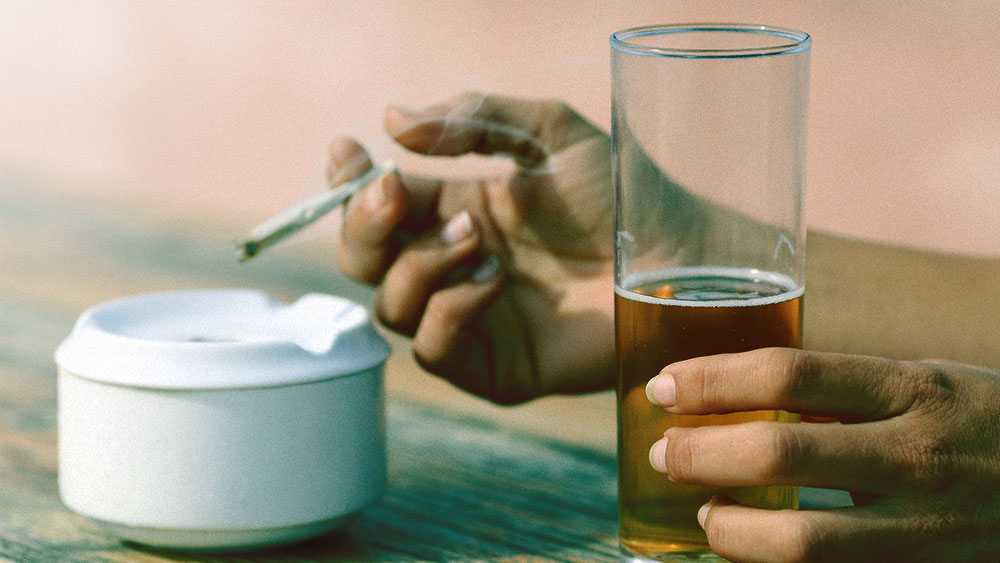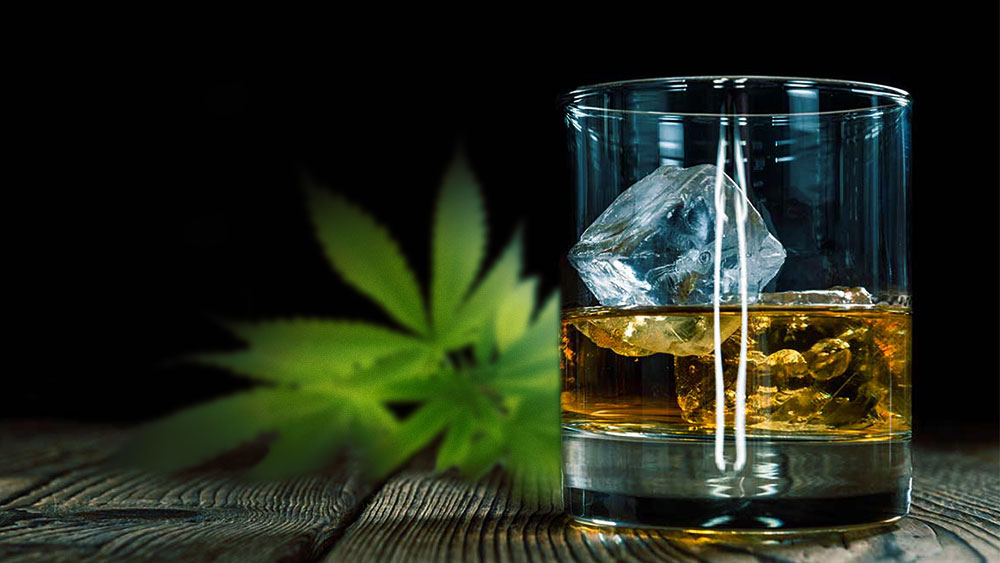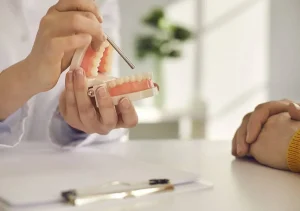With springtime here and winter behind us, many might be getting in the party mood, to stretch out their legs and hit the town.
As we all know, part of the festivities may include certain substances, two of them likely cannabis and alcohol.
On a night out at a bar, chances are high that at some point somebody will whip out a joint.
According to Public Health Ontario, combined use of cannabis and alcohol is the most common form of poly-substance use.
But what exactly happens when the two substances are combined?
Read on for an in-depth look at how cannabis and alcohol mix together and the risks to be aware of.
Alcohol can increase THC levels
If you have ever combined alcohol with cannabis, you may have noticed that the effects of both seemed to be heightened, that it took you to a different level of intoxication.
One study done in 2001 may explain why this is.
Done by Harvard professor Scott Lukas, he found that ethanol in alcohol may actually increase the human body’s ability to absorb THC, the component of cannabis that gives it its psychoactive effects.
Lukas found that when participants in the study consumed ethanol then THC, “they detected marihuana effects more quickly, reported more episodes of euphoria and had higher plasma THC levels than when they consumed placebo ethanol.”
Participants who had large amounts of alcohol and THC had blood levels of THC almost double that of the placebo group.
Lukas concluded from the data that “ethanol may increase the absorption of THC, resulting in an increase in the positive subjective mood effects of smoked marijuana and contributing to the popularity of this drug combination.”
According to the study, the absorption of THC is potentially increased because alcohol makes blood vessels dilate in your digestive system and lungs, which helps more THC get absorbed into your bloodstream when you smoke or eat edibles.
A 2015 study for the journal American Association for Clinical Chemistry showed for the first time that THC levels increased when alcohol was consumed beforehand.
In the study, 19 adults were given a placebo or a low-dose of alcohol 10 minutes before inhaling a placebo, low-dose or high-dose of THC in vaporized cannabis.
The researchers found that with no alcohol, the median maximum blood concentrations for low and high THC doses were 32.7 and 42.2 µg/L THC respectively. This is compared to with alcohol, where the median maximum blood concentrations for low and high THC doses were 35.3 and 67.5 µg/L THC respectively – significantly higher than without alcohol.
Effects of combining THC and alcohol
While combining cannabis and alcohol could produce euphoric effects, as Lukas notes, the effect can also be very intoxicating, which can have its own consequences.
Both cannabis (if it is an indica strain) and alcohol are “downers,” meaning they have a sedative effect.
Research into THC has found that it can help secrete melatonin, a neurotransmitter that causes tiredness and sleep.
When alcohol and cannabis are combined, the sedative effects may be more pronounced and can result in lack of coordination, sluggishness and fatigue.
For anyone who has consumed cannabis and alcohol together, especially in large amounts, lack of coordination may ring true.
When you’re intoxicated by alcohol, staying upright can sometimes be difficult, and that is only conflated by smoking cannabis.
In fact, a 2003 study of cannabis found that 28 per cent of those who took cannabis experienced “severe” symptoms of dizziness out of 29 volunteers.
Judgment may also be impaired, which could lead to actions that have serious consequences, such as unprotected sex.
In vulnerable people, the combination could result in psychotic symptoms such as panic, anxiety or paranoia, according to Australia’s National Cannabis Prevention and Information Centre.
A unique result of taking cannabis and alcohol together is what is referred to as “greening out.” That is when you may get pale and sweaty, feel dizzy and nauseous, get “the spins,” and potentially vomit. Greening out is not a common occurrence with just smoking cannabis, but can happen if alcohol was consumed before.
Another risk of taking cannabis and alcohol together is the potentially increased risk of alcohol poisoning.
Cannabis has an antiemetic effect, which means that it suppresses our reflex to vomit.
This can be troublesome when we’ve had too much to drink, as vomiting is a way to release the excess alcohol from our system.
If the alcohol doesn’t escape our bodies, the risk of alcohol poisoning is increased.

Impaired driving
Now that cannabis is legal in Canada, a new challenge is the potential of driving high after consuming cannabis, made even more challenging if alcohol is also consumed given the highly intoxicating effects of the combination.
Studies have noted this new danger.
A 1998 study published in Human Psychopharmacology found that while cannabis and alcohol taken separately impaired driving, driving was “severely” impaired when the two were combined.
A 2013 study by the Canadian Centre on Substance Use and Addiction and Transport Canada found that cannabis use alone increased the risk of a fatal crash fivefold, but cannabis and alcohol combined increased the risk fortyfold. The study compared British Columbia roadside survey results with post-mortem data on fatally-injured drivers to come to its results.
A U.S. Department of Transportation study found that out of 1,882 motor vehicle deaths, there was an increased risk of accident of 8.4 per cent when alcohol and cannabis was combined – higher than the 0.7 per cent and 7.4 per cent for cannabis and alcohol alone, respectively.
It is currently illegal to have any trace of cannabis in your blood and to have 0.08 percentage of alcohol in your blood when driving.
Cannabis, alcohol industries getting cozy
While cannabis and alcohol present unique dangers when combined together, the two industries appear to be building a closer and closer relationship.
Beer-makers are making deals in droves with cannabis companies, with one product category of particular interest – cannabis drinks, or drinkables.
Drinkables will likely be based on water-soluble THC, which can be quickly absorbed in the body and give the user an immediate effect, much like with alcohol.
While they are currently illegal in Canada until edible laws are finalized in October this year, they could pose some serious competition to beer makers when they hit the market, given their similarity to alcoholic beverages.
This potential competition could explain why beer-makers are jumping in early on the drinkables market, to get in on the action rather than have to work against it.
Craft brewery Collective Arts, based in Hamilton, Ontario, has launched a sister company for drinkables in February, alcohol giant Constellation Brands made a $5 billion investment in cannabis producer Canopy Growth in November, cannabis company Hexo Corp. has teamed up with Molson Coors Brewing, and Tilray has a research partnership with Anheuser-Busch.
Draft regulations published in December have created a clear line between alcohol and cannabis though. The proposals suggest that alcohol cannot be added to edibles or drinkables, they can only have 10 milligrams of THC, and have to come in plain packaging and not include words associated with alcohol, such as “wine,” or “beer.”
It is currently illegal to smoke cannabis on patios of bars and restaurants.
Clearly the government wants a clear line between cannabis and alcohol, and not for the two to combine.
The regulations may loosen over time, though.
The first legal patio where you can smoke cannabis, called POTio, is coming to the Toronto Craft Beer Festival this summer. While the POTio is strictly a alcohol-free zone and attendees who are clearly drunk won’t be allowed in, since it is a beer festival, people will likely be consuming alcohol around the same time they partake in the POTio, bringing alcohol and cannabis closer together.
The sales so far in legalized areas certainly show that there is an appetite for both cannabis and alcohol, but it is hard to say if they are taken together.
Alcohol sales have not fallen in Colorado, Washington state or Oregon since cannabis was legalized there, a recent study by industry group the U.S. Distilled Spirits Council says. Beer sales did fall in those three states, but that was in line with industry trends, the study says.
The same seems to be true in Canada. P.E.I. spent more on alcohol in the last quarter of 2018 than one year earlier – $27.9 million compared to $27.3 million respectively.
It is clear through experience and studies that cannabis and alcohol play on each other strongly and can increase one’s intoxication. This makes it a combination to be wary of and creates new territory for laws to be worked on how to deal with its consequences, such as driving impairment. While it may be a euphoric experience, please be aware of its risks before doing it.






Robert Parker October 28, 2019 at 9:12 am
Did, as a consequence, consumption of cocaine go down in Florida ?...